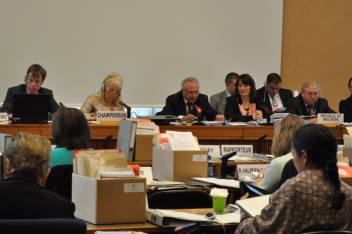 Our Age Demands Action campaign in Moldova started on 28 September with an intergenerational march where older people from around Moldova walked together with the Minister of Social Protection, Family and Child.
Our Age Demands Action campaign in Moldova started on 28 September with an intergenerational march where older people from around Moldova walked together with the Minister of Social Protection, Family and Child.
Straight after, I headed to Geneva to participate in the presentation of the shadow report for the Committee on the Elimination of Discrimination against Women (CEDAW) session.
Moldova was being examined on its implementation of the CEDAW convention. Having the demands of older people still resounding in my head, I was very keen to present their specific needs to the committee. At the meeting, Moldova was represented by 14 civil society NGOs who discussed various issues that women of all ages face.
Older people demand their rights
A briefing meeting was followed by the public session in which I was able to duly introduce and make recommendations on issues such as the right to social security of older people, the right to employment, the right to health and the right to be free from violence.
The recommendations were based on the demands of Age Demands Action delegation of older people. We asked that the committee give the government the following recommendations on behalf of older people:
- increase the level of all pensions to reach the minimum subsistence level,
- abolish discriminatory mandatory age limit for employment after retirement,
- strengthen the capacity of those working on domestic violence so they can effectively respond to and address the violence experienced by older women,
- provide affordable and good quality medication to treat age-related chronic diseases in the compulsory healthcare insurance.
I was amazed at the competence of the CEDAW committee members, their great interest and knowledge of women’s issues in different countries, including Moldova and their commitment to making a difference through their work. They had thorough knowledge of the report of Moldova and asked excellent questions, and were very tough in getting straight answers for them.
Crucial role of civil society
I was curious to hear the Government of Moldova’s report and was happy that several members of the committee raised the issues of older people; namely pensions and employment. However, I was disappointed by some of the Government’s answers that showed a lack of information about the real situation of older people.
Listening to the government’s discourse I became even more convinced of the crucial role civil society has to play in bridging the gap between legal provision and its implementation at the grassroots, and in raising awareness of both the duty bearers and rights holders about the real situation of older people. Perhaps unsurprisingly, the committee was not able to build a dialogue with the Government by the end of the meeting.
Note: Moldova ratified the CEDAW convention in 1994. The first report was presented in 2000 and then in 2006 there was a joint report of the second and third reports. 2013 combined the fourth and fifth periodic reports of Moldova on the implementation of the convention.
I would like to thank Bridget Sleap, HelpAge’s Senior Rights Policy Adviser for her great support in the preparation of the report and OHCHR in Moldova and SOROS Foundation of Moldova for facilitating my participation on the CEDAW session in Geneva.
Read more about our work to support older people’s rights.
